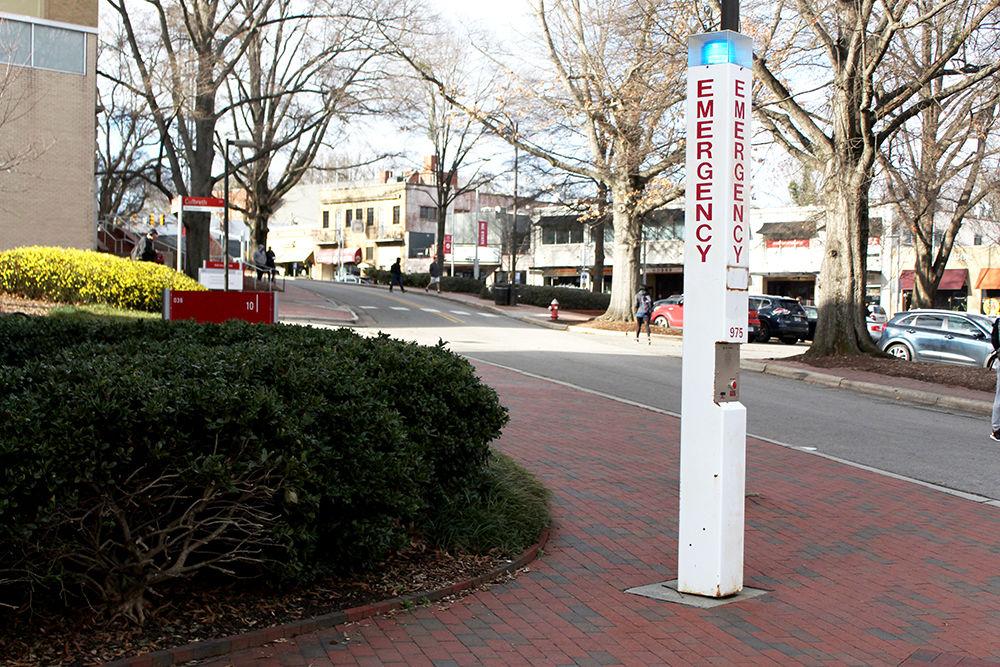Editor’s Note: This article contains mentions of sexual assault and may be disturbing for some readers. Reader discretion is advised.
*The article’s headline and lede has been edited to more accurately reflect the contents of the story
Earlier this semester, campus police issued a WolfAlert about a report of a man sexually assaulting a female student on campus after meeting on a dating app. While the federal Clery Act mandates these types of campus-wide updates when the university gets reports of violent crimes, this was the first sexual assault WolfAlert to note how to reported assailant met the survivor.
Due to COVID-19, NC State experts are warning that fewer public locations to meet and vet dates can mean more health and safety risks, including sexual assault.
Carlyn Wright-Eakes, the interpersonal violence prevention education coordinator at the Women’s Center, spoke about how students can be safe using dating apps and the definition of consent in the NC State Code of Student Conduct, which is important for any student to understand, especially if they are creating online dating profiles to interact with strangers.
“Consent is made freely, willingly and actively by all parties,” Wright-Eakes said. “It is able to be withdrawn at any time. It is an affirmative decision that is given by clear action or words … consent is not obtained through silence. It is not obtained if the person is underage, if the person is sleeping, unconscious or incapacitated, and it can’t be obtained through the use of force, threats, intimidation or coercion.”
According to Wright-Eakes, in college, most students are dating more frequently than they have in the past, which brings about new challenges and risks. However, dating in college and during a pandemic adds a new level of health and safety risks when the online component is added.
Wright-Eakes also said that COVID-19 has influenced many college students’ decisions to form connections through dating apps. The main risk comes with fewer places to meet up in public, so people are more likely to meet at a stranger’s apartment or college dorm.
Wright-Eakes said students should take safety precautions when meeting people from a dating app in real life, such as telling someone where you are going and who you are meeting, or trying to video chat with the person before meeting in person.
“Trust your instincts on how you are feeling about somebody,” Wright-Eakes said. “I would suggest a meeting, if you can, in a public place, because you don’t necessarily want to give out your home address or apartment unless it’s somebody that you trust and feel OK meeting for the first time.”
David R. Kelly, field operations commander with NC State Police, also advised students to be cautious when meeting online connections in person.
“If there is anything that is said or done [during a date] that makes you feel uncomfortable, leave immediately, call a friend or relative or call the local law enforcement agency if off campus, or university police if you are on campus,” Kelly said. “If you are not sure, you can always call university police, and we will assist you in connecting with the correct off-campus law enforcement agency to assist you.”
Regardless of how many precautions an individual takes, Wright-Eakes said there is always a risk of sexual assault or unwanted sexual activity when interacting with people on dating apps.
“[Consent] is also something that needs to be made every time and at every step of the process,” Wright-Eakes said. “So, even if someone is consenting to meet up with somebody on an online app, it doesn’t mean that they are consenting to any form of sexual activity.”
Wright-Eakes also said if a sexual assault happens, it is in no way the victim’s fault.
Kelly said resources for sexual assault survivors include the NC State Counseling Center, Women’s Center, Student Health Services, university police or another law enforcement agency, if the incident occurred off campus.
Kelly added that the survivor should preserve evidence of the incident, including physical evidence (clothing) or digital evidence (pictures or text messages).
“If the survivor does not feel comfortable in reporting the incident to law enforcement, they can contact other departments within the University,” Kelly said.
If you or someone you know is experiencing relationship violence, sexual violence or stalking and are in need of advocacy services, the NC State Women’s Center has trained advocates available to offer crisis intervention, emotional support, resources and referrals. Students can contact the 24/7 Sexual Assault Helpline at 919-515-4444 or ncsuadvocate@ncsu.edu to be connected with an advocate.
Advocacy services through the NC State Women’s Center are available for all students, inclusive of all gender identities and sexual orientations. For more information on advocacy services, please visit go.ncsu.edu/supportsurvivors. Students can also visit go.ncsu.edu/safe for additional information on resources and reporting options.








